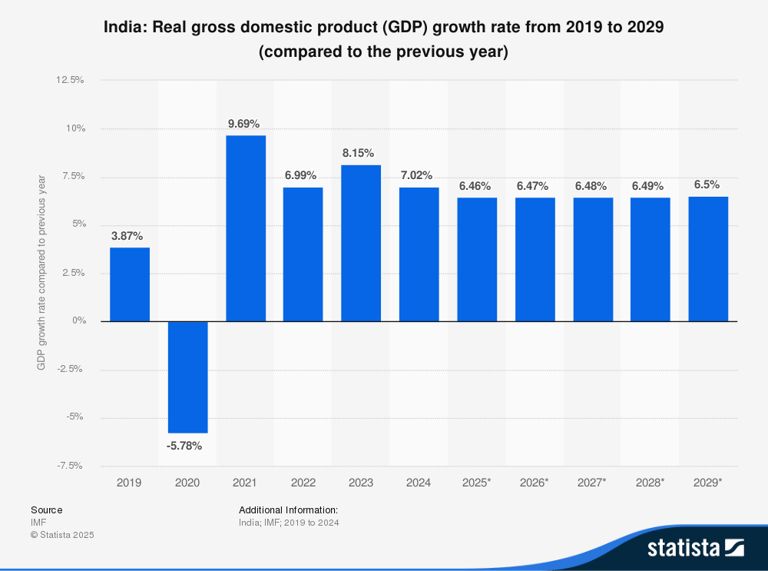Why India?
India: The Strategic Edge for German Innovation and Limitless Growth


How German Companies Benefit from Business with India
Businesses from Germany and elsewhere in Europe should consider expanding to India for several compelling reasons.
Large and Growing Market
India is the world's fifth-largest economy and is projected to become the third-largest by 2030. With a population of over 1.4 billion, it offers a massive consumer base.
The growing middle class, increasing disposable incomes, and urbanization are driving demand for a wide range of goods and services.
Favorable Demographics
India has a young population, with a median age of around 28 years, making it a hub for a dynamic and skilled workforce.
This demographic dividend is ideal for industries like manufacturing, IT, and services.
Cost-Effective Labor and Manufacturing
India offers competitive labor costs, making it an attractive destination for manufacturing and outsourcing.
The government’s "Make in India" initiative encourages foreign companies to set up production facilities, offering incentives and easing regulations.
Strategic Location
India’s geographic location provides easy access to key markets in Asia, the Middle East, and Africa, making it a strategic hub for trade and logistics.
Establishing a presence in India can serve as a gateway to other South Asian markets, offering additional growth opportunities.
Government Reforms and Ease of Doing Business
The Indian government has implemented significant reforms to improve the business environment, such as simplifying tax structures (GST), reducing bureaucracy, and offering incentives for foreign investment.
Initiatives like Digital India and Startup India are fostering innovation and entrepreneurship.
Strong Bilateral Relations
Germany and India share a strong strategic partnership, with collaborations in areas like technology, renewable energy, and infrastructure.
Germany is India’s largest trading partner in Europe, and both countries are committed to deepening economic ties.
Thriving Sectors for Collaboration
Renewable Energy: India is one of the world’s largest markets for renewable energy, and German expertise in green technology can play a key role.
Automotive: India is a major automotive market, and German companies like Volkswagen, BMW, and Bosch already have a strong presence.
IT and Digital Transformation: India’s IT sector is globally renowned, offering opportunities for German businesses to collaborate on digital innovation.
Infrastructure: India’s infrastructure development plans align with Germany’s engineering and construction capabilities.
Skilled Workforce
India has a large pool of English-speaking, highly skilled professionals in fields like engineering, IT, and management, which can support German businesses in their operations.
Cultural and Historical Ties
India and Germany have a long history of cultural and academic exchanges, fostering mutual understanding and trust.
In summary, India’s economic potential, strategic location, and favorable business environment make it an attractive destination for German businesses looking to expand globally.


How Indian Companies Benefit from German Investment in India
Indian businesses are likely to welcome German firms to India for several reasons, as collaboration with German companies can bring significant mutual benefits. There are some key reasons why Indian businesses would embrace German firms.
Access to Advanced Technology and Innovation
German firms are known for their cutting edge technology, particularly in sectors like automotive, engineering, renewable energy, and manufacturing. Indian businesses can benefit from German expertise to upgrade their operations and improve efficiency.
Collaboration with German firms can help Indian companies adopt Industry 4.0 technologies, such as automation, IoT, and AI.
Enhanced Quality Standards
German companies are renowned for their high quality products and processes. Partnering with them can help Indian businesses improve their quality standards and gain a competitive edge in both domestic and international markets.
Job Creation and Skill Development
German investments in India often lead to the creation of jobs and the transfer of skills and knowledge to the local workforce. This can help Indian businesses build a more skilled and productive workforce.
Boost to Manufacturing and Infrastructure
German firms bring expertise in advanced manufacturing and infrastructure development, which aligns with India’s "Make in India" and "Atma Nirbhar Bharat" (self-reliant India) initiatives.
Collaboration with German companies can help Indian businesses modernize their manufacturing processes and infrastructure.
Access to Global Markets
German firms have a strong global presence and established supply chains. Partnering with them can help Indian businesses gain access to international markets and expand their global footprint.
Sustainability and Green Technology
Germany is a global leader in renewable energy and sustainability. Indian businesses, particularly in sectors like energy, automotive, and construction, can benefit from German expertise in green technologies, helping them meet sustainability goals and comply with environmental regulations.
Strengthening Bilateral Trade Relations
Germany is India’s largest trading partner in Europe, and increased collaboration can further strengthen economic ties. Indian businesses can leverage this relationship to explore new opportunities in Europe and beyond.
Investment and Funding Opportunities
German firms often bring significant capital investment, which can help Indian businesses scale up their operations, invest in R&D, and explore new markets.
Knowledge Transfer and Best Practices
German firms are known for their efficient management practices and operational excellence. Indian businesses can learn from these best practices to improve their own processes and organizational structures.
Collaboration in Key Sectors
Automotive: German automotive giants like Volkswagen, BMW, and Bosch already have a strong presence in India. Collaboration in this sector can help Indian companies adopt advanced manufacturing techniques and electric vehicle (EV) technologies.
Renewable Energy: German expertise in solar, wind, and hydrogen energy can help India achieve its renewable energy targets.
Healthcare and Pharmaceuticals: German firms can collaborate with Indian pharmaceutical companies to develop innovative healthcare solutions.
IT and Digital Transformation: German firms can partner with India’s IT sector to drive digital innovation and smart city projects.
Cultural and Historical Ties
India and Germany have a long history of cultural and academic exchanges, fostering mutual trust and understanding. This makes collaboration between businesses from both countries more seamless.
Government Support and Incentives
The Indian government actively encourages foreign investment and collaboration through initiatives like "Make in India," "Digital India," and "Startup India." These programs provide a favorable environment for German firms to establish partnerships with Indian businesses.




Challenges to German Firms Operating in India
German firms operating in India may encounter several challenges due to differences in business environments, cultural practices, regulatory frameworks, and economic conditions.
Regulatory and Bureaucratic Hurdles
Complex Regulations: India's regulatory environment can be complex and fragmented, with frequent changes in policies and compliance requirements.
Bureaucratic Delays: Obtaining licenses, permits, and approvals can be time-consuming due to bureaucratic inefficiencies.
Taxation Issues: Navigating India's tax system, including GST (Goods and Services Tax) and customs duties, can be challenging.
Cultural Differences
Business Practices: Indian business culture often emphasizes relationships and personal connections, which may differ from the more formal and structured German approach.
Communication Styles: Differences in communication styles, including indirect communication in India versus direct communication in Germany, can lead to misunderstandings.
Hierarchical Structures: Indian organizations tend to have more hierarchical structures, which may contrast with the flatter organizational structures common in Germany.
Infrastructure Challenges
Inadequate Infrastructure: Despite improvements, India still faces issues with transportation, logistics, and power supply, which can affect operations.
Urban Congestion: Traffic congestion in major cities can lead to delays in the movement of goods and personnel.
Labor Market Issues
Skill Gaps: While India has a large workforce, there may be a mismatch between the skills available and those required by German firms.
Labor Laws: India's labor laws can be rigid and complex, making it difficult to hire and manage employees.
Employee Turnover: High employee turnover rates in certain sectors can be a challenge for maintaining continuity and training.
Market Competition
Intense Competition: Indian markets are highly competitive, with both local and international players vying for market share.
Price Sensitivity: Indian consumers are often price-sensitive, which can pressure firms to lower prices and margins.
Intellectual Property (IP) Concerns
IP Protection: Enforcement of intellectual property rights can be weak, leading to concerns about counterfeiting and IP infringement.
Political and Economic Risks
Policy Uncertainty: Changes in government policies or political instability can create uncertainty for businesses.
Economic Fluctuations: India's economy can be volatile, with fluctuations in currency exchange rates and economic growth impacting business operations.
Supply Chain Issues
Vendor Reliability: Dependence on local suppliers and vendors can be risky if they are unreliable or fail to meet quality standards.
Logistics Challenges: Inefficiencies in logistics and supply chain management can lead to delays and increased costs.
Environmental and Social Concerns
Sustainability Issues: German firms, which often prioritize sustainability, may face challenges in aligning with local environmental practices.
Corporate Social Responsibility (CSR): India has specific CSR requirements that firms must comply with, which can be an additional burden.
Legal Disputes
Judicial Delays: The Indian legal system can be slow, with prolonged litigation processes that can be frustrating for firms used to more efficient systems.
Contract Enforcement: Enforcing contracts and resolving disputes can be challenging due to legal complexities and delays.
By understanding and addressing these challenges, German firms can better position themselves for success in the Indian market. And a suitable Indian partner can help you do just that!


Cultural Challenges to German Firms in India
Cultural differences can pose significant challenges for German firms operating in India. These challenges stem from differences in business practices, communication styles, work ethics, and social norms. Here are some of the key cultural problems German firms might face in India:
Communication Styles
Indirect Communication: Indians often use indirect communication to avoid confrontation or to show respect. This can be confusing for Germans, who typically value direct and straightforward communication.
High-Context vs. Low-Context: Indian communication is high-context, meaning much is conveyed through non-verbal cues and implied meanings. Germans, on the other hand, are low-context communicators, relying more on explicit verbal information.
Hierarchical Structures
Respect for Hierarchy: Indian organizations tend to have a strong hierarchical structure, with significant respect for authority and seniority. This can contrast with the flatter organizational structures often found in German firms, where decision-making may be more decentralized.
Decision-Making: In India, decisions are often made at the top levels of the hierarchy, which can slow down the decision-making process compared to the more collaborative approach in German firms.
Relationship-Oriented Business Practices
Personal Relationships: Business in India often relies heavily on personal relationships and trust. Germans may find it challenging to build these relationships initially, as their business culture tends to be more transactional and task-oriented.
Networking: Socializing and networking outside of formal business settings are important in India. Germans may need to adapt to this more relational approach to business.
Work Ethic and Time Management
Flexible Time Perception: Indians may have a more flexible perception of time, leading to a more relaxed approach to deadlines and punctuality. This can be frustrating for Germans, who typically value punctuality and strict adherence to schedules.
Work-Life Balance: The concept of work-life balance can differ, with Indians sometimes prioritizing work commitments over personal time, especially in senior positions.
Negotiation Styles
Bargaining and Flexibility: Negotiations in India can involve a lot of bargaining and flexibility, with a focus on building long-term relationships. Germans may be more accustomed to straightforward negotiations with a focus on immediate terms and conditions.
Consensus Building: Indians may seek consensus and avoid direct conflict during negotiations, which can be perceived as indecisiveness by Germans.
Cultural Sensitivity and Diversity
Cultural Diversity: India is a culturally diverse country with multiple languages, religions, and traditions. German firms need to be sensitive to this diversity and avoid a one-size-fits-all approach.
Festivals and Holidays: Understanding and respecting Indian festivals and holidays is important, as they can significantly impact business operations and employee availability.
Management and Leadership Styles
Authoritative vs. Participative Leadership: Indian managers may adopt a more authoritative style, while German managers often prefer a participative approach. This difference can lead to misunderstandings and conflicts in management practices.
Feedback and Criticism: Providing direct feedback and criticism, which is common in German culture, may be perceived as harsh or disrespectful in India. Indians may prefer a more indirect approach to feedback.




